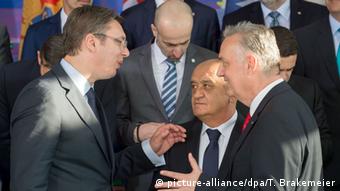EU
Merkel: Brexit will not stop the enlargement of the EU
The countries of the Western Balkans have a clear EU perspective, even after the British Referendum, the main message of the summit in Paris. A new youth work is to connect the Region’s already close.

Finally a good news for the Western Balkans. The Brexit vote does not deteriorate the chances of the States of the Western Balkans accession to the EU, announced the German Chancellor Angela Merkel and French President Francois Hollande on Monday in a Western Balkans summit in Paris. The prospect of joining the EU would be maintained, even after the British “no”, said Angela Merkel at the Elysee Palace. “It has changed with the decision of the UK nothing.”
In Paris, the heads of government of the six Western Balkan countries of Albania, Bosnia-Herzegovina, Kosovo, Macedonia, Montenegro and Serbia, with representatives of the EU and the EU member States Germany, France, Italy, Croatia, Austria and Slovenia discussed on Monday. It was the third Western Balkans summit after a first Meeting in Berlin in 2014 and a second in 2015 in Vienna. In addition to the further integration steps for the six countries from the Region was also talked about economic projects, the common fight against terrorism and the refugee crisis.
Consolidation before expansion?
From the star-studded conference was, therefore, sent a strong Signal. Yes, the Western Balkans have a clear European perspective. Yes, they wanted to lead the six countries of the Region closer to the EU. Only: How is this possible? The shock after the UK Referendum is still fresh.

Merkel (left) looks Brexit as an obstacle to EU enlargement
With the Brexit has the willingness to include new member countries in the other a severe shock suffered. Even EU Commission President Jean-Claude Juncker is of the opinion that it will take for the foreseeable future, no new members. Consolidation to go before enlargement, the currency in Brussels.
It is, ultimately, to comply with the conditions laid down, “to the accession process forward,” Merkel said in Paris. “And as each country reaches a different level.” The EU foreign policy chief Federica Mogherini reiterated: “We are committed to the process of EU enlargement to continue.”

Of Serbia head of government Aleksander Vučić (left) was also in 2014 when the first Western Balkans summit in Berlin
And it goes on: On the summit, it was announced that Serbia may open up from now on, two controversial Chapter (23/24) in the negotiations for accession to the EU. The head of government Aleksander Vučić, clearly delighted with the agreement, said: “The EU is the place where the future for our peoples and our countries is the Best.” Up to EU accession a lot of work and many efforts are still necessary.
Croatia has abandoned its blockade policy. “It is clarified as well as everything, let’s work on shaping the future,” the Croatian head of government, Tihomir Orešković.
Following the EU sought
The economy of the whole Region has been suffering from for several years. The number of unemployed persons in the Western Balkans grew, according to media reports, to 1.6 million. Due to lack of prospects at home, try in the meantime, many of the young and better qualified, a new life in the West. The political tensions between the countries increased significantly. Independent media are suppressed. The refugee crisis worsened the sound between the neighbors Serbia and Croatia.

Refugees remain on the Serbian side of the transit zone to Hungary (photo: DW)
A joint, especially a realistic perspective in the EU, the best peace policy in the Region, where the war wounds are still very fresh. “Some EU countries may well not be tired of the whole Integration, we are,“ said the Serbian Minister of Finance Dusan Vujovic.
Youth work as a peace policy
In addition to negotiations and talks, an agreement on the establishment of a youth office for the Balkan region was signed in Paris. It aims to promote the exchange between young people of the former war region. Model of the German-French youth work. Merkel described the signing on Monday as “a great success”. It countries, the aim was to bring together, “which have not yet produced a few years ago, the war against each other,” said the Chancellor.